Scottish Haulage REBORN
Page 129
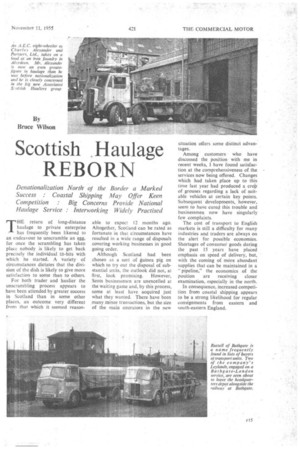
Page 130
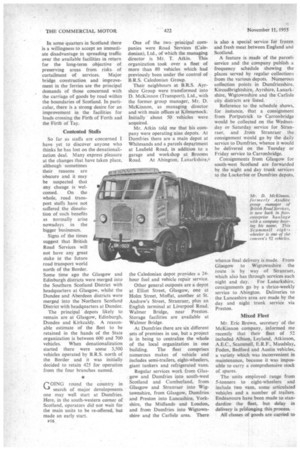
Page 137
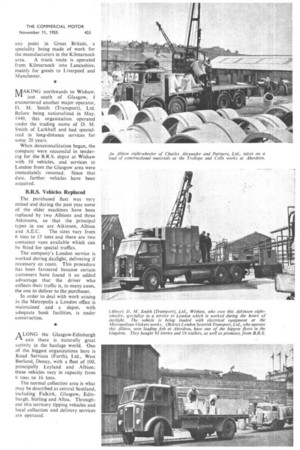
Page 138
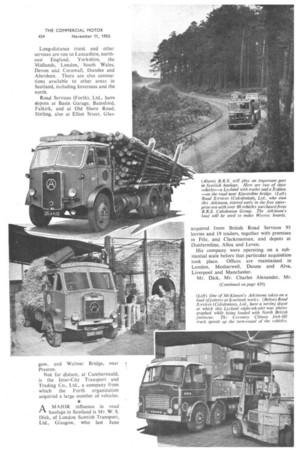
Page 159
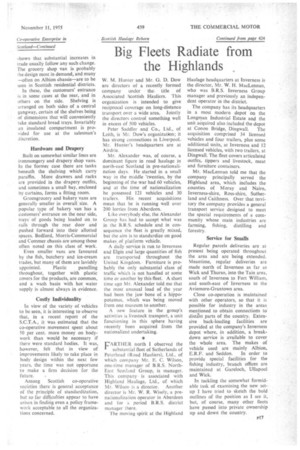
If you've noticed an error in this article please click here to report it so we can fix it.
Denationalization North' of the Border a Marked Success : Coastal Shipping May Offer Keen Competition : Big Concerns Provide National Haulage Service : Interworking Widely Practised By Bruce Wilson
THE return of long-distance haulage to private enterprise
• has frequently been likened to an endeavour to unscramble an egg, for once the scrambling has taken place nobody is likely to get back precisely the individual tit-bits with which he started_ A variety of circumstances dictates that the division of the dish is likely to give more satisfaction to some than to others.
For both trader and haulier the unscrambling process appears to have been attended by greater success in Scotland than in some other places, an outcome very different from that which it seemed reason. able to expect 12 months ago. Altogether, Scotland can be rated as fortunate in that circumstances have resulted in a wide range of disposals covering working businesses in good going order.
Although Scotland had been chosen as a sort of guinea pig on which to try out the disposal of substantial units, the outlook did not, at first, look promising. However, Scots businessmen are unexcelled at the waiting game and, by this process, some at least have acquired just what they wanted. There have been many minor transactions, but the size of the main onerators in the new situation offers some distinct advantages.
Among customers who have discussed the Position with me in recent weeks, I have found satisfaction at the comprehensiveness of the services now being offered. Changes which had taken place up to this time last year had produced a crop of grouses regarding a lack of suitable vehicles at certain key points. Subsequent developments, however, seem to have cured this trouble and businessmen now have singularly few complaints.
The cost of transport to English markets is still a difficulty for many industries and traders are always on the alert for possible economies. Shortages of consumer' goods during the past 15 years have placed emphasis on speed of delivery, but, with the coming of more abundant supplies that can be maintained in a "pipeline" the economics of the position are receiving closer examination, especially in the north.
In consequence, increased competition from coastal shipping appears to be a strong likelihood for regular consignments from eastern and south-eastern England. In some quarters in Scotland there is a willingness to accept an immediate disadvantage in spreading traffic over the available facilities in return for the long-term objective of preserving areas from risksof curtailment of services. Major bridge construction and improvement in the ferries are the principal demands of those concerned with the carriage of goods by road within the boundaries of Scotland. In particular, there is a strong desire for an improvement in the facilities for loads crossing the Firth of Forth and the Firth of Tay.
Contented Staffs
So far as staffs are concerned I have yet to discover anyone who thinks he has lost on the denationalization deal. Many express pleasure at the changes that have taken place, although sometimes their reasons are obscure and it may be suspected that any change is welcomed. On the whole, road transport staffs have not suffered the dissolution of such benefits as normally arise nowadays in the bigger businesses.
Signs of the times suggest that British Road Services will not have any great stake in the future road transport world north of the Border. Some time ago the Glasgow and Edinburgh districts were merged into the Southern Scotland District with headquarters at Glasgow, whilst the Dundee and Aberdeen districts were merged into the Northern Scotland District with headquarters at Dundee.
The principal depots likely to remain are at Glasgow, Edinburgh, Dundee and Kirkcaldy. A reasonable estimate of the fleet to be retained in the hands of the State organization is between 600 and 700 vehicles. When denationalization started there were some 3,500 vehicles operated by B.R.S. north of the Border and it was initially decided to retain 425 for operation from the four branches named.
GOING round the country in
search of major developments one may well start at Dumfries. Here, in the south-western corner of Scotland, operators did not wait for the main units to be re-offered, but made an early start. One of the two principal companies were Road Services (Caledonian), Ltd., of which the managing director is Mr. T. Atkin. This organization took over a fleet of more than -80 vehicles which had previously been under the control of B.R.S. Caledonian Group.
Their neighbours at B.R.S. Ayrshire Group were transformed into D. McKinnon (Transport), Ltd., with the former group manager, Mr. D. McKinnon, as managing director and with main offices at Kilmarnock. Initially about 50 vehicles were acquired.
Mr. Atkin told me that his company were operating nine depots. At Dumfries there are a main depot at Whitesands and a parcels department at Leafield Road, in addition to a garage and workshop at Brooms Road. At Abington, Lanarkshire, the Caledonian depot provides a 24hour fuel and vehicle repair service.
Other general outposts are a depot at Elliot Street, Glasgow, one at Holm Street, Moffat, another at St. Andrew's Street, Stranraer, plus an English terminal at Liverpool Road, Walmer Bridge, near Preston. Storage facilities are available at Walmer Bridge.
At Dumfries there are six different sets of premises in use, but a project is in being to centralize the whole of the local organization in one building. The fleet comprises numerous makes of vehicle and includes semi-trailers, eight-wheelers, giant tankers and refrigerated vans.
Regular services work from Glasgow and Dumfries into south-West Scotland and Cumberland, from Glasgow and Stranraer into Wigtownshire, from Glasgow, Dumfries and Preston into Lancashire, Yorkshire, the Midlands and London, and from Dumfries into Wigtownshire and the Carlisle area. There is also a special service for frozen and fresh meat between England and Scotland.
A feature is made of the parcels service and the company publish a frequency schedule showing the places served by regular collections from the various depots. Numerous collection points in Dumfriesshire, Kircudbrightshire, Ayrshire, Lanarkshire, Wigtownshire and the Carlisle city districts are listed.
Reference to the schedule shows, for instance, that a consignment from Portpatrick to Carronbridge would be collected on the Wednesday or Saturday service for Stranraer, and from Stranraer the consignment would go by the daily service to Dumfries, whence it would be delivered on the Tuesday or Friday service to Carronbridge.
Consignments from Glasgow for south-west Scotland are forwarded by the night and day trunk services to the Lockerbie or Dumfries depots, whence final delivery is made. From Glasgow to Wigtownshire the route is by way of Stranraer, which also has through services each night and day. For Lanarkshire, consignments go by a thrice-weekly service to Abington. Deliveries to the Lancashire area are made by the day and night trunk service via Preston.
Mixed Fleet
Mr. Eric Brown, secretary of the McKinnon company, informed me recently that their fleet of 52 included Albion, Leyland, Atkinson, A.E.C., Scammell, E.R.F., Maudslay, Foden, Bedford and Austin vehicles, a variety which was inconvenient in maintenance, because it was impossible to carry a comprehensive stock of spares.
The units employed range from 5-tonners to eight-wheelers and include two vans, some articulated vehicles and a number of trailers. Endeavours have been made to standardize the fleet, but delay in delivery is prolonging this process.
All classes of goods are carried to any point in Great Britain, a speciality being made of work for the manufacturers in the Kilmarnock area. A trunk route is operated from Kilmarnock into Lancashire, mainly for goods to Liverpool and Manchester.
MAKING northwards to Wishaw,
just south of Glasgow, I encountered another major operator, D. M. Smith (Transport), Ltd. Before being nationalized in May, 1949, this organization operated under the trading name of D. M. Smith of Larkhall and had specialized in long-distance services for some 20 years.
When denationalization began, the company were successful in tendering for the B.R.S. depot at Wishaw with 10 vehicles, and services to London from the Glasgow area were immediately resumed. Since that date, further vehicles have been acquired.
B.R.S. Vehicles Replaced
The purchased fleet was very mixed and during the past year some of the older machines have been replaced by two Albions and three Atkinsons, so that the principal types in use are Atkinson, Albion and A.E.C. The sizes vary from 6 tons to 15 tons and there are two container vans available which can he fitted for special traffics.
The company's London service is worked during daylight, delivering if necessary en route. This procedure has been favoured because certain customers have found it an added advantage that the driver who collects their traffic is, in many cases, the one to deliver to the purchaser.
In order to deal with work arising in the Metropolis a London office is maintained and a depot, with adequate bank facilities, is under construction.
ALONG the Glasgow-Edinburgh
axis there is naturally great activity in the haulage world. One of the biggest organizations here is Road Services (Forth), Ltd., West Borland, Denny, with a fleet of 100, principally Leyland and Albion; these vehicles vary in capacity from 6 tons to 16 tons.
The normal collection area is what may be described as central Scotland, including Falkirk, Glasgow, Edinburgh, Stirling and Alloa. Throughout this territory tipping vehicles and local collection and delivery services are operated. Long-distance trunk and other services are run to Lancashire, northeast England, Yorkshire, the Midlands, London, South Wales, Devon and Cornwall, Dundee and Aberdeen. There are also connections available to other areas in Scotland, including Inverness and the north.
Road Services (Forth), Ltd., have depots at Basin Garage, Bainsford, Falkirk, and at Old Shore Road, Stirling, also at Elliot Street, Glas gow, and Walmer Bridge, near Preston.
Not far distant, at Cumbernauld, is the Inter-City Transport and Trading Co., Ltd., a company from which the Forth organization acquired a large number of vehicles.
AMAJOR influence in road haulage in Scotland is Mr. W. S. Dick, of London Scottish Transport, Ltd., Glasgow, who last June acquired from British Road Services 93 lorries and 19 trailers, together with premises in Fife, and Clackmannan, and depots at Dunfermline, Alloa and Leven.
His company were operating on a sub stantial scale before that particular acquisition took place. Offices are maintained in London, Motherwell, Doune and Alva, Liverpool and Manchester.
Mr. Dick, Mr. Charles Alexander, Mr. ,hown that substantial increases in trade usually follow any such change. The grocery shop van is probably the design most in demand, and many —often on Albion chassis—are to be seen in Scottish residential districts.
In these, the customers' entrance is in some eases at the rear, and in others on the side. Shelving is arranged on both sides of a central gangway, certain of the shelves being of dimensions that will conveniently take standard bread trays. Invariably an insulated compartment is provided for use at the salesman's discretion.
Hardware and Drapery
Built on somewhat similar lines are ironmongery and drapery shop vans. In the former case there are tanks beneath the shelving which carry paraffin. More drawers and racks are provided in the drapery outfits, and sometimes a small bay, enclosed by curtains, forms a fitting room.
Greengrocery and bakery, vans are generally smaller in overall. size. A popular type of bakery van has a customers' entrance on the near side, trays of goods being loaded on to rails through the rear door and pushed forward into their allotted spaces. Bedford, Morris-Commercial and Cominer chassis are among those often noted on this class of work.
Even smaller vans are favoured by the fish, butchery and ice-cream trades, but many of them are lavishly appointed. Plastic panelling throughout, together with plastic covers for the products, are common, and a wash basin with hot water supply is almost always in evidence.
Costly Individuality
In view of the variety of vehicles to be seen, it is interesting to observe that, in a recent report of the S.C.T.A., it was estimated that the co-operative movement spent about 50 per cent. more money on bodywork than would be necessary if there were standard bodies. It was, however, felt that in view of improvements likely to take place in body design within the next few years, the time was not opportune to make a firm decision for the future.
Among Scottish co-operative societies there is general acceptance of the principle of standardization, but so far difficulties appear to have arisen in finding even a policy framework acceptable to all the organizations concerned.
































































































































































































































































































